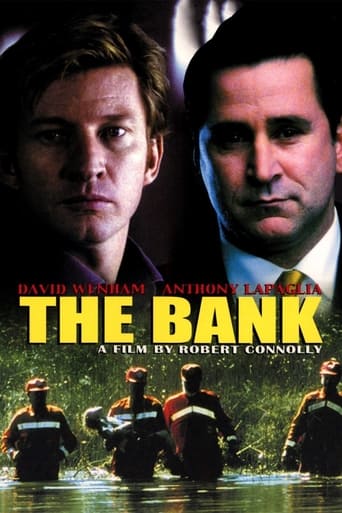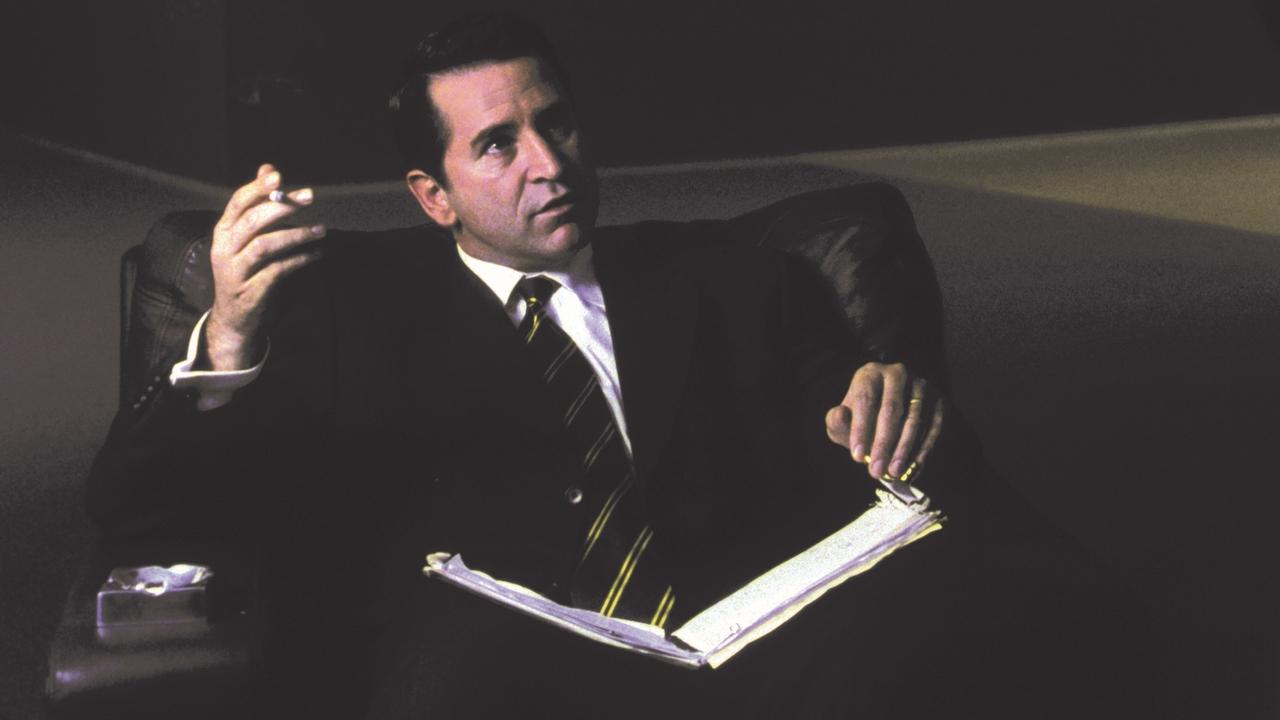isabelle1955
I can't quite make my mind up about this Australian movie, The Bank. I've watched it three times now, and it's certainly a pretty good movie, entertaining and well made. But it should be a very good movie, and somehow it's not. I'm still trying to decide quite why.The central premise is quite interesting. Math genius Jim Doyle (David Wenham), has written a computer program that will allow him to beat the stock market. It will accurately predict ups and downs in share prices so well that he or anyone who uses it will be able to make the ultimate insider dealer killing at the expense of the market. Or save themselves from financial ruin, depending on your viewpoint. But the program is not quite ready, it still needs some tweaking and that requires the kind of computing power only a rich financial institution such as a major bank can provide. Enter Anthony LaPaglia, playing Simon O'Reilly, an antipodean Gordon Gecko, the boss of an Australian bank who has just been told by his board to increase the profit margin pronto or seek alternative employment. Add a supporting cast of assorted bank employees, Jim's genius Japanese friend, a young couple losing their business to bank foreclosure and their son to tragedy, and a love interest (Michelle Roberts played by pretty Sybilla Budd), and we have the potential for an interesting and reasonably original movie. And let's face it, there haven't been that many riveting films about high finance, so it has an open field.But will Jim get his program perfected in time, can anyone even a banker truly be as one dimensionally unpleasant as Simon O'Reilly (and that's a reflection of the script not Anthony LaPaglia's acting, which is fine), is the love interest really a bank insider planted to keep an eye on Jim from under the sheets and is Jim Doyle even who he appears to be? The plot is fairly unlikely, as the chances of one man, no matter how clever, being given uncontrolled access to a bank's supercomputer, are remote. However I am quite willing to believe that a bank or any other major institution might readily bend the law to increase profits (think Enron), so suspending belief here isn't that much of a stretch. There is a bit of a twist in the end, but I found the characters all a little one dimensional. I wasn't convinced by the "genius writing formulae on tablecloths" characterization of Jim (all the math/engineering types I used to know used cigarette packets. Is the tablecloth a politically correct substitute for a non smoking world?) but the movie looks like it cost quite a lot to make, which is a credit to the director, as I suspect by Hollywood standards it cost very little, and the fractals are worth the entry price alone.My main problem is that some of the dialogue is little clichéd. For example, Jim and Michelle's exchange when they go back to his apartment after their first date; Jim (as they undress each other): "Shouldn't we get to know each other first?" Michelle: "But supposing we don't like each other?" Jim: "You're right". Quite. Cut to morning-after-the-night-before shot of Jim awaking looking suitably tousled while Michelle obviously an early riser takes the opportunity to go through his private possessions.Now I will say at the outset that I'm a little biased, as David Wenham could stand in front of the camera reciting nursery rhymes while wearing a monk's habit and I would pay to watch (oh hang on, wasn't that Van Helsing?) Seriously, he gives another good performance. Whenever has he not given a good performance? Anthony LaPaglia is a terrific actor too, and they should both be much better known here in the USA than they currently are. Sybilla Budd was, perhaps, a little flat as Michelle, but again that's probably more a reflection of the dialogue than her acting. I found the scene at Simon's party where she launches into a tirade against her host, quite unconvincing. Surely no one over the age of consent could be that naïve? The cast were pretty solid, and the cinematography fine, but that basic central premise Big Bank Bad, Small Guy Good is just too simplistic for this particular middle aged cynic, and I really find hard to swallow that 700 thousand (Australian?) dollars in their bank account is any recompense to a couple who have just lost their only child and then been truly and publicly screwed in court. And hang on, haven't the bank just gone bust, so where did that 700 grand come from again? But I'm struggling here to decide exactly what it is that disappoints me about this film, and I have to come to the conclusion that maybe the fault is with me, and not the movie. I guess I'm just too cynical?
George Parker
"The Bank" teams a math whiz kid (Wenham) and his proprietary computer program which can accurately predict stock market trends with a ruthless bank CEO (LaPaglia) as they set about to make an obscene fortune at the expense of widespread econimic ruination . The film focuses on the institution everyone loves to hate, the bank, and pits ethics against hardball business while mixing in a dash of romance and murderous intentions. Not bad for a journeyman auteur (Connolly) with a low budget, "The Bank" conjures some solid drama for those who can get past the technobabble and make the few leaps of faith required to get mentally in the envelope. Slick but not without its plotholes, "The Bank" is a lukewarm three star drama worth a look. (B-)
jotix100
Greed is at the core of this film. It's incredible how money can corrupt people to the point that it will make them do things that ultimately, they will live to regret. It was a surprise to see this Australian film that only played a couple of weeks in New York. It's a much better picture than some of the very highly regarded ones that came out just about the same time and are still around, while this one went back to Australia, probably.The director, Robert Connelly presents us with a story that's very plausible. In it, the greedy banker, played with fine assurance by Anthony LaPaglia, wants to be able to get rich with a scheme that is presented to him by the mysterious David Wenham.Aside from some of the technical aspects of the financial world, it is very entertaining and very nicely acted by all the actors in it.
frankgaipa
For perhaps half an hour, this is an engaging, math-based sci-fi thriller. A lot of fractal imagery, some table-cloth scribbling, a table-cloth spill, talk about chaos theory. First key, in a scene from the protagonist's childhood, is an explanation of the ramifications of compound interest. Second, in a corporate sweatbox dedicated to programming stock market predictions, is a line that could have come out of Asimov's "Foundation" novels: "It's hard as hell to predict what one man will do; take a hundred, it's much easier." Not long after this line, a conventional plot takes over. You could go home, write the remainder of the film yourself, and probably catch most of the telegraphed surprises.Touchpoints for the first half hour: "Pi," "Moebius," "Enigma," the more statistical of Stanislaw Lem's novels (The Chain of Chance, The Investigation). Kobo Abe's novels and the films based on a few of them ("Sunna no onna," "Tanin no kao," etc.) without stooping to actual numbers, all ooze the mathematics of choice and chance. What's a dune made of, besides the sand? What's a face made of, one's own or another's, besides the cells?



 AD
AD


